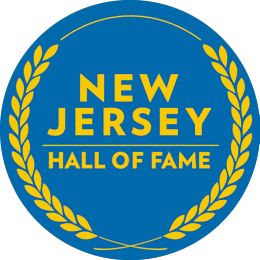 It’s not just Jersey Shore that has put the Garden State on the map! Major contributions by people from our local area have had an impact in a variety of ways. The New Jersey Hall of Fame, which for the past 10 years has honored people whose talents and tenacity have made a difference, has recently narrowed down its list of nominees for the Class of 2022. The 50 nominees were either were born, lived in or contributed to life in New Jersey. Of the 50, seven of them made their mark in Mercer County, NJ on their way to greatness.
It’s not just Jersey Shore that has put the Garden State on the map! Major contributions by people from our local area have had an impact in a variety of ways. The New Jersey Hall of Fame, which for the past 10 years has honored people whose talents and tenacity have made a difference, has recently narrowed down its list of nominees for the Class of 2022. The 50 nominees were either were born, lived in or contributed to life in New Jersey. Of the 50, seven of them made their mark in Mercer County, NJ on their way to greatness.
Trenton-born Supreme Court Justice Antonin Scalia was one of many who have demonstrated it’s not just where you’re from, it’s where you go! Though he hadn’t lived locally for decades, his 30 years on the Supreme Court led the decorated New Jerseyan to be posthumously inducted into the New Jersey Hall of Fame last year.
The voting is underway (until May 20th) to choose this year’s class of inductees. You can see all of the nominees and vote here. As you consider, we wanted to share the accomplishments of those were born, lived in or passed through the greater Princeton area.
Ralph Izzo

Just a few weeks ago, Ralph Izzo announced that he will be retiring as the Chairman, President and CEO of Public Service Enterprise Group (PSE&G). And now, he will allegedly become President of EV Edison, where he will help develop national EV charging hubs. But it was right here in 1981 that the Cranbury resident started his career in energy as a research scientist working on fusion energy experiments at Princeton Plasma Physics Laboratory. He later spent years working in public policy, under Senator’s Bill Bradley and Thomas Kean. Izzo’s since gone on to receive numerous national fellowships and awards and joined a variety of boards and committees nationally and locally including the U.S. Department of Energy’s Fusion Energy Sciences Advisory Committee. More locally, Izzo helps shape young minds through his roles on the Board of Trustees of The Peddie School and as part of Princeton University’s Andlinger Center for Energy and Environment Advisory Council.
Izzo has served as PSE&G’s CEO for 15 years but has been at the company for 30. He joined New Jersey’s largest energy company in 1992, working his way through as a vice president in four different areas before becoming President and Chief Operating Officer. He became CEO in 2007 and has since continued to work towards the goal of cleaner energy.
Hall of fames aren’t new to Izzo. In 2010 he was honored with the Trustee Award by the New Jersey Inventors Hall of Fame in recognition of his energy-efficient programs and tackling the challenges of climate control. Izzo is nominated by the NJ Hall of Fame in the Enterprise category.
John McPhee
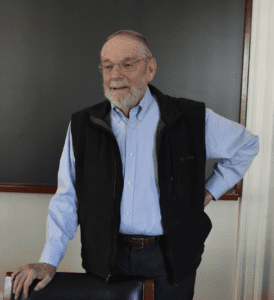
John McPhee was born in 1931. His father was Princeton University’s sports director, and he grew up in the tree streets of town. Known as one of the early developers of creative nonfiction, he made a name for himself as a journalist and writer who takes details and makes them entertaining. McPhee has written about a variety of subject matter, from basketball player Bill Bradley to the wilderness, even a book simply about an orange.
McPhee has been helping to develop writing for approximately 500 young adults since 1975 as a Princeton University writing professor, and the Princeton-born and Princeton University-educated writer does so with a solid resume. He has written over 30 books, and though he is not one to boast, he’s earned himself a Pulitzer Prize for his book Annals of the Former World along with National Book Award nominations for eight others. McPhee started writing at Time magazine in 1957 and has since spent more than six decades as a staff writer for the The New Yorker, for which he’s written hundreds of pieces.
The Ferris Professor of Journalism is still teaching Creative Non-Fiction at Princeton University and is now nominated in the Arts & Letters category.
Bebe Neuwirth

One of the famous lines from the hit Broadway musical A Chorus Line is, “Oh please – I don’t want to hear about how Broadway’s dying. ‘Cause I just got here.” Ironically, that line is said by a character named Bebe…and though she didn’t play that role, it was as the character of Shelia in a tour of A Chorus Line that legendary actor/singer/dancer Bebe Neuwirth made her professional debut which propelled her into years of Broadway and other acting successes.
Neuwirth was born in New Jersey and grew up right here in Princeton. While her father worked at Princeton University, she attended kindergarten through 8th grade at Chapin School. She then went on to complete 9th grade at Princeton Day School before finishing out her last three years of high school at Princeton High School (Class of 1976). Her mother was a ballerina with Princeton Regional Ballet Company, with whom Bebe performed in her youth. After graduating high school, she advanced her career in the arts at Julliard.
Neuwirth appeared on Broadway shortly after her gig in the touring production A Chorus Line, with roles in Dancin’ and Little Me and quickly made her way to leading lady, where she won the Tony award in a revival of Sweet Charity in 1986. She debuted as Lilith that same year, the Cheers role that would earn her two Emmy awards. Neuwirth spent several years working small TV and film roles and returned to Broadway to win the Tony and Drama Desk awards for her role in Chicago in 1997.
Since then, she has appeared in a variety of TV, film and stage roles. She was the featured guest at the McCarter Gala in 2012, the Princeton theatre where she first appeared on stage at age 7. Neuwirth is nominated in the Performing Arts & Entertainment category.
Stanley Dancer

If you recently watched Rich Strike win the Kentucky Derby, you can appreciate what it takes to win in horse racing. One of this year’s nominees can relate. Born in West Windsor, Stanley Dancer was raised on his family’s farm in New Egypt. He dropped out of school in 8th grade, but went on to achieve great success, becoming the only harness racing driver to train and drive three Triple Crown winners and the first to win more than $1 million dollars in one season. The son of dairy and potato farmers, Dancer started driving horses at the Freehold Raceway and bought his first horse after getting married.
Unlike Rich Strike, who took off in the final stretch to win, Dancer started a style where horses were trained to take off hard right from the start. This style was even more impressive given his slight height and weight, at 5 feet 8 inches, 135 pounds.
Throughout his career, he drove 23 Triple Crown winners. Dancer was inducted in the Harness Racing Living Hall of Fame in 1970 for his accomplishments and is now nominated by the NJ Hall of Fame in the Game category.
Dorothea Dix
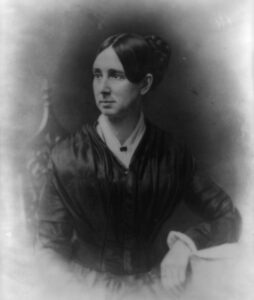
Though women are still working hard in 2022 to make their marks in the sciences, it was back in the 1800s that Dorothea Dix built the first mental health facilities in America. She noticed that the mentally ill jailed in Massachusetts were not being properly treated for their conditions. In 1840 she lobbied for more proper care, then moved on to evaluate the facilities in New Jersey. By 1845 she had shared her findings with the NJ legislature, urging them to do better, too. The New Jersey State Lunatic Asylum opened in Trenton in 1948, it was one of several facilities to open thanks to the advocacy of Dix.
Born in Maine in 1802, the work of Dix was way ahead of its time. She was a champion for both indigenous people as well as the mentally ill. Through her continued work with politicians on the state and federal levels, she eventually opened asylums in North Carolina, Illinois, Rhode Island and New York as well.
The field of nursing also benefitted from the achievements of Dix. She served as Superintendent of Army Nurses for the Union Army during the Civil War, where she not only cared for soldiers from both sides but paved the way for more females to train and work as a nurse. More than 3,000 female nurses went through the Federal Army nursing program under her leadership during the war.
Dix returned to the capital of New Jersey in 1881 and spent her final days in a special suite at New Jersey State Hospital (originally New Jersey State Lunatic Asylum and now Trenton Psychiatric Hospital). She died there in 1887 at the age of 85 and is posthumously nominated in the Public Service category.
Edith Savage-Jennings
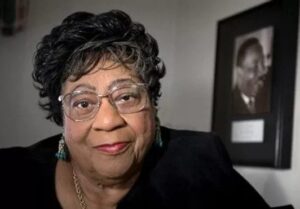
How many people can state they were invited to be a guest at the White House by 13 sitting Presidents? Civil rights activist Edith Savage-Jennings was one.
Growing up in New Jersey, her life’s work started as a child. She met First Lady Eleanor Roosevelt at age 11 and relied on her as an ally of civil rights for over 30 years. At 12, Savage-Jennings became a youth member of the Trenton Chapter of the National Association for the Advancement of Colored People (NAACP) and at age 13, she insisted on sitting in the orchestra section at Capital Theater in Trenton rather than the segregated balcony, citing a fear of heights. Then, for the rest of her 93 years, she would continue the fight.
Savage-Jennings was honored with more than 100 awards for her civil rights involvement, working as a trusted friend of Dr. Martin Luther King, Jr. and later founding The King Center along with his wife, Coretta. She worked to help integrate a school in Mississippi and lobbied to make New Jersey the first state to divest its investments in South Africa.
Savage-Jennings supported the opening of the Museum of Women’s Resistance in Brooklyn, NY in 2012. Just two years later, the site acquired an official second name as The Edith Savage-Jennings Legacy Museum.
In 2017, at age 93, Savage-Jennings spoke at the Women’s March in Trenton. Later that year, on November 12, she passed away. But her legacy continues to live on. The City of Trenton has officially declared February 19th as Edith Savage-Jennings Day. She is posthumously nominated in the Public Service category.
George Shultz
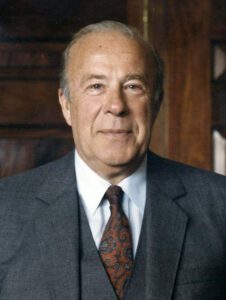 Having worked in four cabinet-level positions under multiple Republican Presidents, George Shultz was a dedicated diplomat. He passed away just last year at the age of 100, known for numerous accomplishments including helping President Ronald Reagan to end the Cold War.
Having worked in four cabinet-level positions under multiple Republican Presidents, George Shultz was a dedicated diplomat. He passed away just last year at the age of 100, known for numerous accomplishments including helping President Ronald Reagan to end the Cold War.
Shultz was raised in Englewood, NJ but he passed through Princeton as he worked towards his bachelor’s degree in economics at Princeton University in 1942.
After serving as a Marine, Shultz got his PhD at M.I.T. and went on to share his knowledge in a variety of ways. He taught at three well-respected universities, was a distinguished fellow at the Hoover Institution and held federal cabinet roles as secretary of state, treasury and labor as well as the first director of the office of management and budget. Shultz was first brought to the federal government for three roles under Nixon, and then again under Reagan. He is posthumously nominated in the Public Service category.

Lisa Jacknow spent years working in national and local news in and around New York City before moving to Princeton. Working as both a TV producer and news reporter, Lisa came to this area to focus on the local news of Mercer County at WZBN-TV. In recent years, she got immersed in the Princeton community by serving leadership roles at local schools in addition to volunteering for other local non-profits. In her free time, Lisa loves to spend time with her family, play tennis, sing and play the piano. A graduate of the S. I. Newhouse School of Public Communications at Syracuse University, Lisa was raised just north of Boston, Massachusetts but has lived in the tri-state area since college. She is excited to be Editor and head writer for Princeton Perspectives!

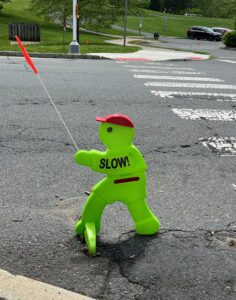 When it comes to protecting their kids and neighbors, adults can be relentless. And when it comes to possible life or death, they will not back down. For over two decades, concern over safety at the main street crossing nearest
When it comes to protecting their kids and neighbors, adults can be relentless. And when it comes to possible life or death, they will not back down. For over two decades, concern over safety at the main street crossing nearest 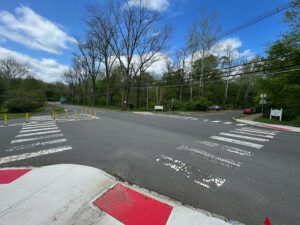 This intersection, at the entrance to Johnson Park Elementary School, is not facilitated by a light or crossing guard. All families on the southbound side of Rosedale are offered a bus, but several students and families that choose to walk or bike must cross there. Most mornings and afternoons cars struggle to make their way back from the school onto Rosedale. This site also aligns with the entrance to
This intersection, at the entrance to Johnson Park Elementary School, is not facilitated by a light or crossing guard. All families on the southbound side of Rosedale are offered a bus, but several students and families that choose to walk or bike must cross there. Most mornings and afternoons cars struggle to make their way back from the school onto Rosedale. This site also aligns with the entrance to 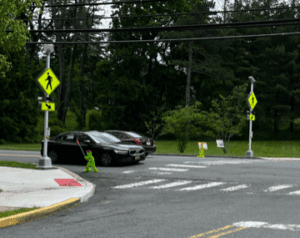 By 2017, parent Amanda (Mandy) Arshan got involved to garner more support for a safer crossing.
By 2017, parent Amanda (Mandy) Arshan got involved to garner more support for a safer crossing.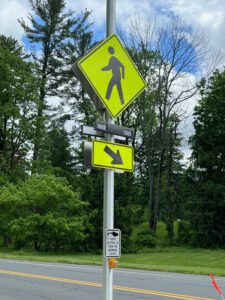 In April 2021, Princeton’s consultant recommended the installation of Rectangular Rapid Flashing Beacons (RRFB) as an interim safety measure at the intersection. According to the U.S. Federal Highway Administration, RRFB consist of “two rectangular-shaped yellow indications, each with an LED-array-based light source, that flash with high frequency when activated” and can reduce pedestrian crashes by 47%. In addition, the PBAC, led by Serieyssol, unanimously approved a resolution they presented to Council in June urging temporary solutions be installed at this intersection until a more permanent one could be completed. These conversations for the SRTS plan led to the installation of the RRFB last summer.
In April 2021, Princeton’s consultant recommended the installation of Rectangular Rapid Flashing Beacons (RRFB) as an interim safety measure at the intersection. According to the U.S. Federal Highway Administration, RRFB consist of “two rectangular-shaped yellow indications, each with an LED-array-based light source, that flash with high frequency when activated” and can reduce pedestrian crashes by 47%. In addition, the PBAC, led by Serieyssol, unanimously approved a resolution they presented to Council in June urging temporary solutions be installed at this intersection until a more permanent one could be completed. These conversations for the SRTS plan led to the installation of the RRFB last summer.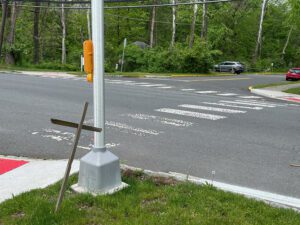 The RRFB installation was completed by the county on August 24th, yet sadly the next day, 82-year-old Pinghua Xu was hit and soon died from the injuries he incurred while crossing at this intersection. It is believed Xu activated the RRFB, but was nonetheless hit by a car traveling eastbound, as he crossed the traffic lanes. His death devastated the community, and especially those that had been fighting to prevent a tragedy like this.
The RRFB installation was completed by the county on August 24th, yet sadly the next day, 82-year-old Pinghua Xu was hit and soon died from the injuries he incurred while crossing at this intersection. It is believed Xu activated the RRFB, but was nonetheless hit by a car traveling eastbound, as he crossed the traffic lanes. His death devastated the community, and especially those that had been fighting to prevent a tragedy like this.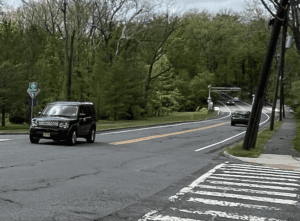 “This year we narrowed the width of the lanes (from 12’ and 13’ to 11’) as a method of traffic calming to reduce speeds,” County Spokesperson Wilmot notes. “This year, we again performed an updated traffic study and will reduce the regulatory speed limit to 35 MPH within the corridor – both directions — and will install a roundabout, which is a Federal Highway Administration Proven Safety Countermeasure and an accepted traffic-calming measure.”
“This year we narrowed the width of the lanes (from 12’ and 13’ to 11’) as a method of traffic calming to reduce speeds,” County Spokesperson Wilmot notes. “This year, we again performed an updated traffic study and will reduce the regulatory speed limit to 35 MPH within the corridor – both directions — and will install a roundabout, which is a Federal Highway Administration Proven Safety Countermeasure and an accepted traffic-calming measure.”
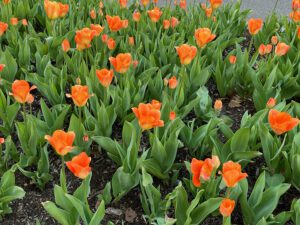 If you didn’t grow up in the Princeton area, what brought you here? Perhaps a job opportunity arose. But before accepting, did you Google “Princeton” to see what the area could offer you besides a salary? If you were looking to move out to the suburbs, did you Google “Princeton” to check out the schools, activities and more that would be available for your family? Odds are, if you did, you likely found “Princeton,” or a local business, named at or near the top of “best of” lists everywhere.
If you didn’t grow up in the Princeton area, what brought you here? Perhaps a job opportunity arose. But before accepting, did you Google “Princeton” to see what the area could offer you besides a salary? If you were looking to move out to the suburbs, did you Google “Princeton” to check out the schools, activities and more that would be available for your family? Odds are, if you did, you likely found “Princeton,” or a local business, named at or near the top of “best of” lists everywhere.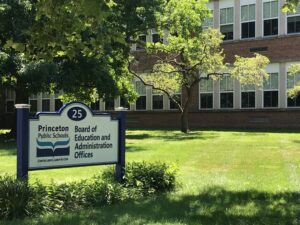 When looking to move to a new town, people with children often look at the school system. How highly is it ranked, what is the graduation rate and more? For Princeton, a repeatedly high ranking as one of the best public school districts has made it an attraction to many. The 2022 rankings by
When looking to move to a new town, people with children often look at the school system. How highly is it ranked, what is the graduation rate and more? For Princeton, a repeatedly high ranking as one of the best public school districts has made it an attraction to many. The 2022 rankings by  Academics are a top priority for many in this Ivy League college town, where more than 87% of
Academics are a top priority for many in this Ivy League college town, where more than 87% of 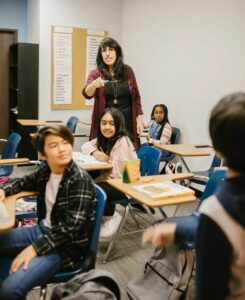 With a student population that is neurodiverse, PPS is also comprised of students from varying backgrounds and ethnicities. In our schools this year there are 50.1% White, 20.8% Asian, 15.9% Hispanic, 5.8% Black and 0.1% American Indian or Alaska Native students enrolled. In addition, 12.6% of the students are of more than one race/ethnicity. This diversity, exposing children to different people and cultures, is what attracts many to the area. Venkat Yaddanapudi says it is one of the things that stood out when considering where to move with his children last year, entering 6th and 9th grade.
With a student population that is neurodiverse, PPS is also comprised of students from varying backgrounds and ethnicities. In our schools this year there are 50.1% White, 20.8% Asian, 15.9% Hispanic, 5.8% Black and 0.1% American Indian or Alaska Native students enrolled. In addition, 12.6% of the students are of more than one race/ethnicity. This diversity, exposing children to different people and cultures, is what attracts many to the area. Venkat Yaddanapudi says it is one of the things that stood out when considering where to move with his children last year, entering 6th and 9th grade.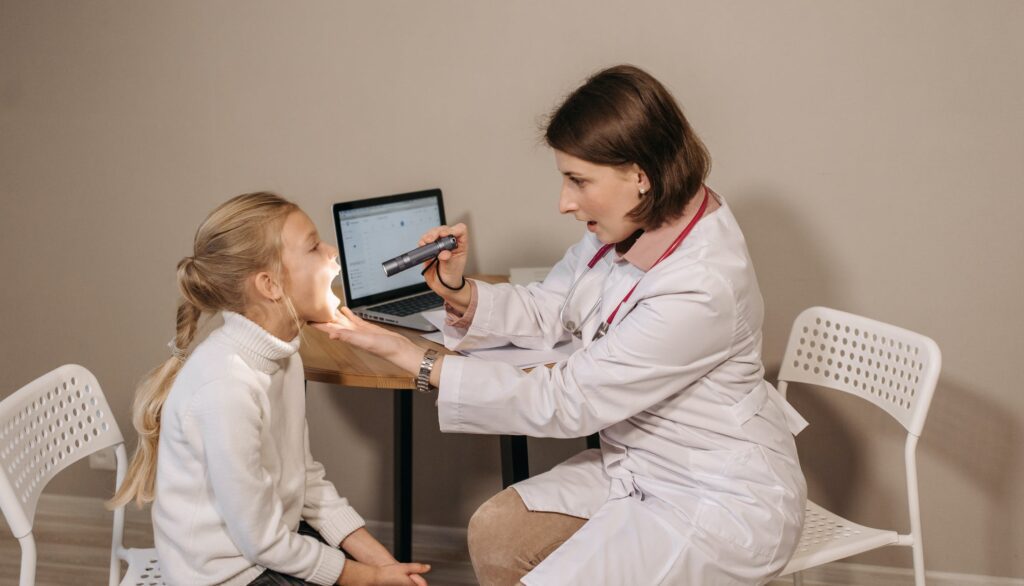 This starts with the collection of health information, ensuring each student is medically cleared. With the pandemic, that workload multiplied. Submission of vaccination data, combined, utilization of the latest technology and cooperation between departments has really helped the district to move ahead and keep sports on track.
This starts with the collection of health information, ensuring each student is medically cleared. With the pandemic, that workload multiplied. Submission of vaccination data, combined, utilization of the latest technology and cooperation between departments has really helped the district to move ahead and keep sports on track. With Princeton University and other renowned institutions in town, world-leading scientific and pharmaceutical companies all around and a top-rated school system, it’s no wonder the Princeton area has the best of the best. Some of the things that make it so great are best kept secrets…but others have been highlighted with awards and recognition that are worth noting. From books to food & beverages, outdoor experiences and more, there are a great deal of “best of” opportunities in our area.
With Princeton University and other renowned institutions in town, world-leading scientific and pharmaceutical companies all around and a top-rated school system, it’s no wonder the Princeton area has the best of the best. Some of the things that make it so great are best kept secrets…but others have been highlighted with awards and recognition that are worth noting. From books to food & beverages, outdoor experiences and more, there are a great deal of “best of” opportunities in our area.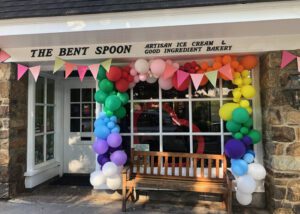 Last year,
Last year, 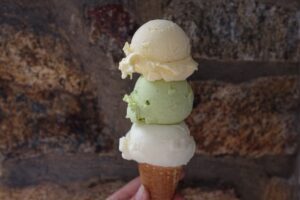 The unique flavors and quality products have been noted not just in the press but by locals and visitors alike. It’s common to see a line from their storefront down the sidewalk in Palmer Square, with people vying for their ice cream. Amongst its accolades, The Bent Spoon has also been cited for 15 years as the best NJ ice cream in NJ Monthly. Travel & Leisure and AAA Magazine highlighted the spot in 2021.
The unique flavors and quality products have been noted not just in the press but by locals and visitors alike. It’s common to see a line from their storefront down the sidewalk in Palmer Square, with people vying for their ice cream. Amongst its accolades, The Bent Spoon has also been cited for 15 years as the best NJ ice cream in NJ Monthly. Travel & Leisure and AAA Magazine highlighted the spot in 2021.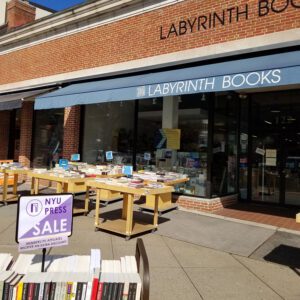
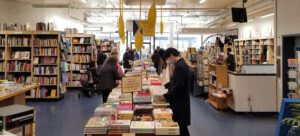 “Folks who get to know our store well know that it’s a place where you can often find books that have disappeared from the shelves elsewhere and about 70% of our inventory is discounted 20-80%.”
“Folks who get to know our store well know that it’s a place where you can often find books that have disappeared from the shelves elsewhere and about 70% of our inventory is discounted 20-80%.”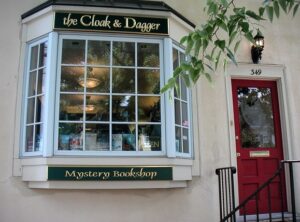 Less than one mile north, also on Nassau Street, sits Princeton’s other local bookstore
Less than one mile north, also on Nassau Street, sits Princeton’s other local bookstore 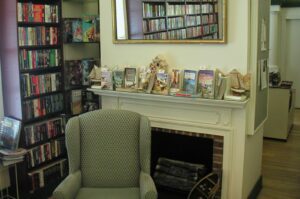 Founded by Aline Lenaz in 2001, the retail space resembles an English reading room, and the shelves are lined with books from authors worldwide including political thrillers from Princeton-based
Founded by Aline Lenaz in 2001, the retail space resembles an English reading room, and the shelves are lined with books from authors worldwide including political thrillers from Princeton-based 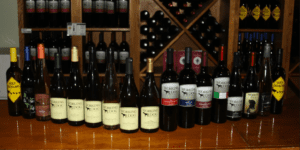 The first, sitting on the border of Robbinsville and East Windsor, is
The first, sitting on the border of Robbinsville and East Windsor, is 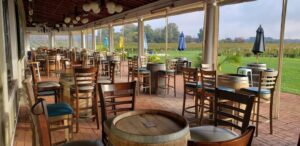 Now with a 100 acre-property (25 vine-planted) and a production of more than 4,000 cases a year, Working Dog Winery welcomes thousands of visitors annually. A typical, sunny day could see over 500 people enjoying tastings or sitting out amongst the 6-acres of maintained grass area, and there’s live music every weekend.
Now with a 100 acre-property (25 vine-planted) and a production of more than 4,000 cases a year, Working Dog Winery welcomes thousands of visitors annually. A typical, sunny day could see over 500 people enjoying tastings or sitting out amongst the 6-acres of maintained grass area, and there’s live music every weekend.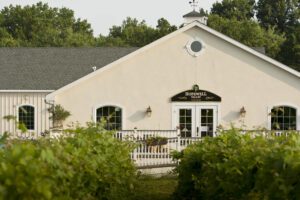
 “With these grapes we produce Pinot Grigio, Chardonnay, Vidal Blank, Dolce Vita, a late harvest Vidal Blank dessert wine, Stony Brook Blush, based mostly on Vidal & minimally on Chambourcin, Rosso Della Valle, our Chambourcin, Barbera and three Port dessert wines, Red, White & Chocolate. In addition, we buy grapes from CA for our Cabernet Sauvignon & White Merlot. We also offer Italian Wines, such as Sangiovese, which are cellared in our winery & a variety of sparkling wines,” adds Neri.
“With these grapes we produce Pinot Grigio, Chardonnay, Vidal Blank, Dolce Vita, a late harvest Vidal Blank dessert wine, Stony Brook Blush, based mostly on Vidal & minimally on Chambourcin, Rosso Della Valle, our Chambourcin, Barbera and three Port dessert wines, Red, White & Chocolate. In addition, we buy grapes from CA for our Cabernet Sauvignon & White Merlot. We also offer Italian Wines, such as Sangiovese, which are cellared in our winery & a variety of sparkling wines,” adds Neri.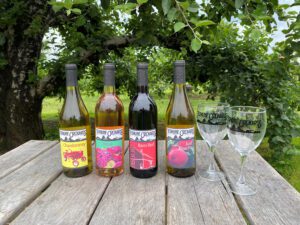 “Now we have 18 varieties we make. We grow all our own grapes and use our homemade apple cider to make our apple wine. It’s been a great addition for us,” notes Tannwen Mount, who developed the idea of adding a winery when she returned from California to work the farm with her parents.
“Now we have 18 varieties we make. We grow all our own grapes and use our homemade apple cider to make our apple wine. It’s been a great addition for us,” notes Tannwen Mount, who developed the idea of adding a winery when she returned from California to work the farm with her parents.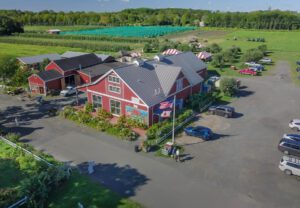
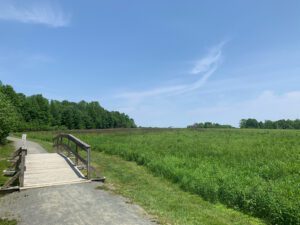 “It is an honor to be recognized by NJRPA and other park professionals throughout the state for our exemplary facilities and programs.” says Aaron T. Watson, Executive Director of Mercer County Park Commission. “The Park Commission is proud to offer a variety of passive and active recreation opportunities to the people of Mercer County, and we’re also responsible for the stewardship and restoration of the natural areas in our park system. With five golf courses, athletic fields, picnic areas, a nature center, an equestrian center, a historic farm, many miles of hiking trails, and even a wildlife rehabilitation center, there is something for everyone in our park system.”
“It is an honor to be recognized by NJRPA and other park professionals throughout the state for our exemplary facilities and programs.” says Aaron T. Watson, Executive Director of Mercer County Park Commission. “The Park Commission is proud to offer a variety of passive and active recreation opportunities to the people of Mercer County, and we’re also responsible for the stewardship and restoration of the natural areas in our park system. With five golf courses, athletic fields, picnic areas, a nature center, an equestrian center, a historic farm, many miles of hiking trails, and even a wildlife rehabilitation center, there is something for everyone in our park system.”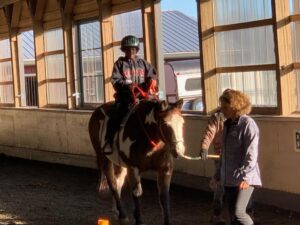 Awards were also granted to
Awards were also granted to 
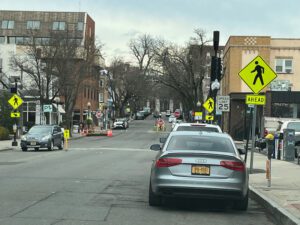 This street is closed…can’t turn there…traffic, traffic, everywhere! No matter where you try to go in Princeton these days, it seems more cars are on the road and road closures don’t make things any easier. Multiple construction projects are underway in and around downtown, with long term goals of creating better environments and infrastructures for enjoying town. Unfortunately, the projects, road closures and reduced parking, in the short term, can make life stressful and complicated. To provide you with a full understanding of what to expect, how you will be affected and what you can look forward to, Princeton Perspectives has the 4-1-1 on all of the changes.
This street is closed…can’t turn there…traffic, traffic, everywhere! No matter where you try to go in Princeton these days, it seems more cars are on the road and road closures don’t make things any easier. Multiple construction projects are underway in and around downtown, with long term goals of creating better environments and infrastructures for enjoying town. Unfortunately, the projects, road closures and reduced parking, in the short term, can make life stressful and complicated. To provide you with a full understanding of what to expect, how you will be affected and what you can look forward to, Princeton Perspectives has the 4-1-1 on all of the changes.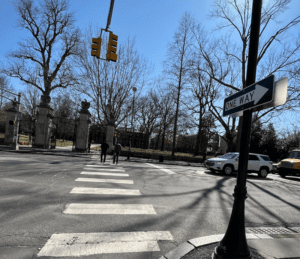 For pedestrians, the biggest change to come will be at the Nassau/Witherspoon traffic light. A project of the
For pedestrians, the biggest change to come will be at the Nassau/Witherspoon traffic light. A project of the 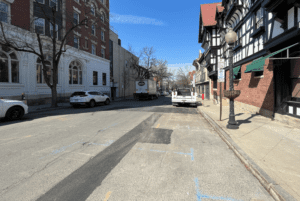 The goal here? To create a more walkable and comfortable outdoor/dining space by widening sidewalks to 18 feet, permanently changing Witherspoon to one-way vehicle traffic from Nassau to Spring Street, with one 12 ft. travel lane and a 10 ft. service lane on the western side of Witherspoon. Several, if not all, of the metered parking spots are likely to be removed.
The goal here? To create a more walkable and comfortable outdoor/dining space by widening sidewalks to 18 feet, permanently changing Witherspoon to one-way vehicle traffic from Nassau to Spring Street, with one 12 ft. travel lane and a 10 ft. service lane on the western side of Witherspoon. Several, if not all, of the metered parking spots are likely to be removed.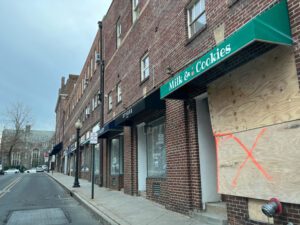 Chambers Street will soon be the crew’s work zone, with traffic shifting, sometimes going down to one lane and possibly times of full closure. The sidewalk at 2-4 Chambers St. and half of the roadway there will be primarily affected. Stores along Nassau St, including
Chambers Street will soon be the crew’s work zone, with traffic shifting, sometimes going down to one lane and possibly times of full closure. The sidewalk at 2-4 Chambers St. and half of the roadway there will be primarily affected. Stores along Nassau St, including 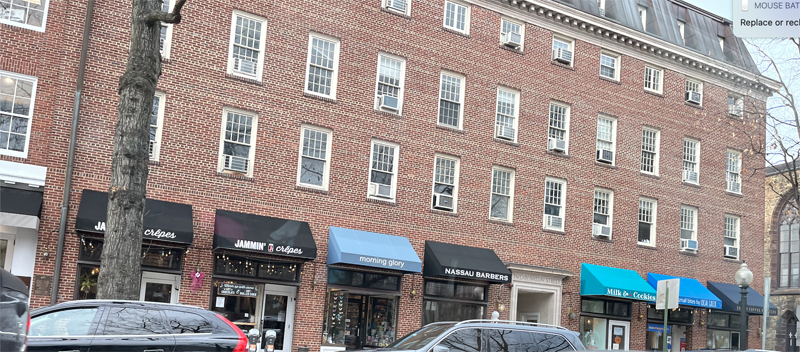 While 20 Nassau stays, the building portion at 2-4 Chambers St. is being torn down. The two will become one and turned into an approximately 180-room hotel with a lobby, grab-and-go café, eatery as well as an 80-space underground parking area for hotel use. The hotel is environmentally designed to a LEED Silver standard. Free bicycle rental is also expected for guests, as many are expected to be in town for the university.
While 20 Nassau stays, the building portion at 2-4 Chambers St. is being torn down. The two will become one and turned into an approximately 180-room hotel with a lobby, grab-and-go café, eatery as well as an 80-space underground parking area for hotel use. The hotel is environmentally designed to a LEED Silver standard. Free bicycle rental is also expected for guests, as many are expected to be in town for the university.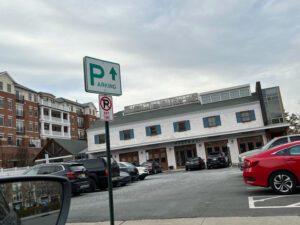 The downtown area is expected to get even busier this year with construction at the lot next to
The downtown area is expected to get even busier this year with construction at the lot next to  With the expansion of 5G, to accommodate increased usage by customers and a desire to enable download of larger files, its estimated 10 small cell sites will be added in Princeton by Verizon that, in conjunction with its other technologies, intend to improve experiences for everyone.
With the expansion of 5G, to accommodate increased usage by customers and a desire to enable download of larger files, its estimated 10 small cell sites will be added in Princeton by Verizon that, in conjunction with its other technologies, intend to improve experiences for everyone.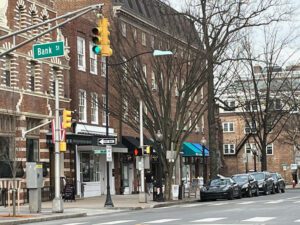 There’s a reason people choose to live in Princeton as opposed to some of the neighboring towns. Besides its highly rated schools, the walkability and vibrancy of town is another strong attraction. Therefore, many would argue that keeping the business community strong and providing opportunities for it to be even stronger and more vibrant would benefit both businesses and residents alike. However, there has been much debate about how to best make this happen.
There’s a reason people choose to live in Princeton as opposed to some of the neighboring towns. Besides its highly rated schools, the walkability and vibrancy of town is another strong attraction. Therefore, many would argue that keeping the business community strong and providing opportunities for it to be even stronger and more vibrant would benefit both businesses and residents alike. However, there has been much debate about how to best make this happen.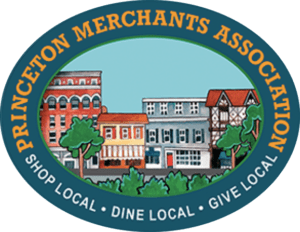 For decades, there have been talks amongst the business community, and under the guidance of the all-volunteer
For decades, there have been talks amongst the business community, and under the guidance of the all-volunteer 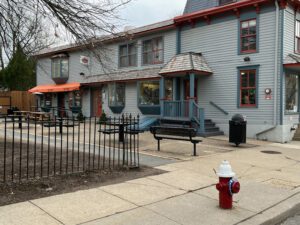 “That’s been an old aspiration of many local entrepreneurs and city leaders. The pandemic has accelerated the need of forming a private corporation with the participation of local authorities to accomplish many tasks oriented to have a better Princeton, for both property and business owners, as well as for residents,” shares Omar Delgado, owner of
“That’s been an old aspiration of many local entrepreneurs and city leaders. The pandemic has accelerated the need of forming a private corporation with the participation of local authorities to accomplish many tasks oriented to have a better Princeton, for both property and business owners, as well as for residents,” shares Omar Delgado, owner of 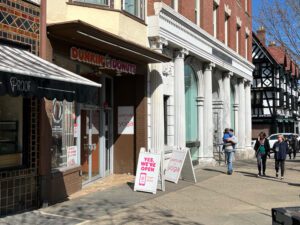 “Perhaps downtown Princeton is not dilapidated, but it certainly needs improvement, and the current methods are not doing the job,” believes Bill Hare, owner of a property at Nassau & Witherspoon that currently houses
“Perhaps downtown Princeton is not dilapidated, but it certainly needs improvement, and the current methods are not doing the job,” believes Bill Hare, owner of a property at Nassau & Witherspoon that currently houses 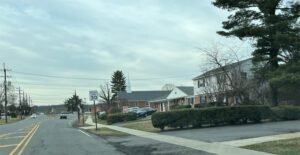 But the community has not all been in agreement. Nearly a dozen property and business owners also called in on Feb. 28th and shared a desire to postpone or stop the vote, citing concerns of how the benefits would outweigh the cost, notably with how far reaching the SID is with regards to some of the businesses it’s chosen to include.
But the community has not all been in agreement. Nearly a dozen property and business owners also called in on Feb. 28th and shared a desire to postpone or stop the vote, citing concerns of how the benefits would outweigh the cost, notably with how far reaching the SID is with regards to some of the businesses it’s chosen to include.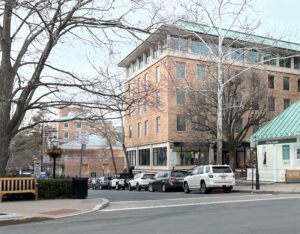 Palmer Square tenants, because they already pay into promotional funding provided by
Palmer Square tenants, because they already pay into promotional funding provided by